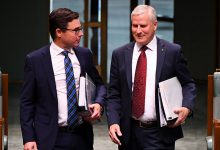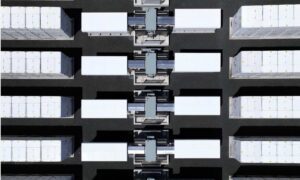If there were any questions over the National Party’s commitment to the coal sector after the loss of Matt Canavan from the resources portfolio, they were quickly answered by new deputy leader David Littleproud who reasserted his party’s commitment to a new coal generator in Queensland on his first day in the job.
In an interview with ABC’s RN Breakfast program on Wednesday, Littleproud trotted out the three consistent assertions of the coal lobby; that you can reduce emissions using more coal, that more coal generation is necessary to lower electricity prices and that baseload power is a necessary feature of the future energy system.
Each of these three assertions have been repeatedly debunked, but it confirms that it’s business as usual in a Morrison cabinet that will continue to face internal divisions over a need to act on climate change and the fossil fuel advocates within its ranks.
It is understood that Queensland Nationals MP Keith Pitt is the front runner to take over Canavan’s former positions as the minister for resources and Northern Australia when new ministerial appointments are announced by Prime Minister Scott Morrison on Thursday.
Pitt himself has been an outspoken advocate for a new coal-fired power station in Queensland, so while Canavan – who liked to describe himself as “Mr Coal” – has exited the federal cabinet, the pressure to push forward with the Collinsville project is likely to continue.
Pitt has also been a strong supporter of a nuclear industry in Australia, and will have the backing of failed Nationals leadership candidate Barnaby Joyce, who again argued for nuclear power to be considered as part of Australia’s efforts to reduce emissions as part of a bizarre Facebook rant against renewable energy.
“We have to recognise that the public acceptance of wind towers on the hill in front of their veranda is gone, and the public dissonance on that issue is as strong as any other environmental subject,” Joyce said.
“If zero emissions are the goal then surely nuclear energy should be supported, but it is not. If wind towers are a moral good and environmentally inoffensive, why can’t we have them just off the beach at Bondi so we can feel good about ourselves while going for a surf? It would cause a riot.”
“Do you want a 3,000ha solar farm next door to you? Lots of glass and aluminium neatly in rows pointing at the sun. I am not sure others will want to buy that view off you when you go to sell your house.”
The coal industry might have lost its most enthusiastic advocate from the federal cabinet, but the Nationals were quick to show that it won’t lead to any changes on the party’s energy and climate change policies.
In his interview, Littleproud, who is also tipped to take on the now vacant agriculture portfolio, told the ABC that investments in new coal generators would help lower emissions and lower electricity prices.
“You need to make sure that you create an environment in the marketplace with a mix of renewables and coal-fired power stations, and if you can improve the emissions of coal fired power stations, you should make that investment if it means that we hit our targets and we reduce energy prices,” Littleproud claimed.
It has been well established for some time that the cheapest source of new electricity generation capacity are renewable sources like wind and solar.
A recent update to the CSIRO’s GenCost assessment of the costs of different generation technologies re-confirmed that new wind and solar are, by far, the cheapest sources of electricity generation. Even when additional storage is accounted for, prices of firmed renewables are competitive with fossil fuel generators when the costs of carbon emissions are considered.

Renewables are already helping to drive down electricity prices.
This week, the ACT, which has recently achieved its 100 per cent renewable electricity target, is also set to see an almost 7 per cent fall in its electricity prices this year, as the territory’s investments in wind and solar projects have helped deliver lower electricity prices for Canberra households, ensuring they continue to pay some of Australia’s lowest electricity prices.
But this also didn’t stop Littleproud asserting that it is possible to achieve reductions in greenhouse gas emissions while still embracing coal.
“You can invest in clean coal technology in and reduce emissions,” Littleproud said.
“I’m not disputing the science, what I’m saying is I’m not gifted academically to have that science background myself.” – @D_LittleproudMP when asked about his recent statement that he didn’t know if climate change was man made. #abc730 @leighsales #auspol pic.twitter.com/sFh44eNP2a
— abc730 (@abc730) February 4, 2020
Again, there are fundamental limits to how much emissions from coal-fired power stations can be improved. Even with a complete transition to the Coalition’s favoured high-efficiency low-emissions (HELE) coal power station technologies, the most generous estimates put the amount of emissions reductions at 20 per cent.
In his review of the National Electricity Market, chief scientist Dr Alan Finkel compared the emissions intensity of different generation technologies, showing that the HELE coal-fired power stations promoted by the Nationals will still produce 0.7 tonnes of carbon dioxide equivalent for each megawatt-hour of electricity produced, and is only slightly below the NEM’s current average emissions intensity.

When the science, and the international commitments made under the Paris Agreement, are calling for governments to achieve zero net emissions by 2050, a 20 per cent cut in coal power station emissions is going to be grossly insufficient.
It’s a position that leaves the Nationals at odds with science, but also the business community which is undergoing an accelerating exit from the coal industry. This includes BlackRock, which manages USD$7 trillion (A$10.15 trillion) in investments, which announced in January that it was divesting its portfolios from thermal coal companies.
Littleproud argued for the need for “baseload” power, suggesting that coal-fired power stations are necessary, as Australia currently lacks sufficient levels of battery storage.
“We’ve still got to have baseload, the thing is that we don’t have battery storage to the capacity that we need to be able to keep the lights on,” Littleproud said.
With the emergence of new energy management technologies, a growing market for energy storage that is outpacing growth in coal generation in Australia, demand response platforms and the falling prices of renewables, the concept of baseload is quickly becoming outdated.
With system planners recognising the crucial role that a ‘flexible’ energy system will have into the future, pushing new inflexible baseload power stations, like a new coal generator, into the energy system will only be counterproductive.
Chair of the Energy Security Board, which has been tasked with redesigning Australia’s energy market in response to the widescale transformation underway in the energy sector, labelled Australia’s existing “baseload” generators as “dinosaurs”, singling out coal-fired generators Bayswater and Liddell saying that their inflexibility made them poorly suited to a future energy system.
There has been a surge of installations of large-scale battery storage systems, and new investments continue to be made in deploying storage projects, while coal-fired generators are readying to exit the market.
The renewed push from the Nationals for a new coal generator appears to have been bolstered by the findings of a $10 million feasibility study into a potential new coal-fired power station in Collinsville. The feasibility study was funded as part of the government’s Underwriting New Generation Investments initiative and has yet to be released publicly.
“Collinsville, there’s a there’s now a report that’s come back to say that that business case should advance and then obviously, that will be backed by the economics of it,” Littleproud told ABC’s RN Breakfast.
The saga of the Collinsville power station has been a source of tension within the Coalition party room. Outgoing resources minister Matt Canavan had been desperate to get the project off the ground, and confronted prime minister Scott Morrison when he thought progress on the proposal was progressing too slowly.
Those tensions continue to play out in the party room, with a fiery confrontation occurring during the first coalition party room meeting of the year, and after a summer dominated by bushfires and calls for stronger climate action.
Several Nationals members shouted down calls from moderate Liberal MPs, who called for the Morrison government to demonstrate that it was taking climate change seriously.








